- Home
- H. Rider Haggard
Complete Allan Quatermain Omnibus - Volumes 1 - 10 Page 4
Complete Allan Quatermain Omnibus - Volumes 1 - 10 Read online
Page 4
Next came the question of provisioning and medicines, one which required the most careful consideration, for what we had to do was to avoid lumbering the wagon, and yet to take everything absolutely necessary. Fortunately, it turned out that Good is a bit of a doctor, having at some point in his previous career managed to pass through a course of medical and surgical instruction, which he has more or less kept up. He is not, of course, qualified, but he knows more about it than many a man who can write M.D. after his name, as we found out afterwards, and he had a splendid travelling medicine chest and a set of instruments. Whilst we were at Durban he cut off a Kafir's big toe in a way which it was a pleasure to see. But he was quite nonplussed when the Kafir, who had sat stolidly watching the operation, asked him to put on another, saying that a "white one" would do at a pinch.
There remained, when these questions were satisfactorily settled, two further important points for consideration, namely, that of arms and that of servants. As to the arms I cannot do better than put down a list of those which we finally decided on from among the ample store that Sir Henry had brought with him from England, and those which I owned. I copy it from my pocket-book, where I made the entry at the time.
"Three heavy breech-loading double-eight elephant guns, weighing about fifteen pounds each, to carry a charge of eleven drachms of black powder." Two of these were by a well-known London firm, most excellent makers, but I do not know by whom mine, which is not so highly finished, was made. I have used it on several trips, and shot a good many elephants with it, and it has always proved a most superior weapon, thoroughly to be relied on.
"Three double-500 Expresses, constructed to stand a charge of six drachms," sweet weapons, and admirable for medium-sized game, such as eland or sable antelope, or for men, especially in an open country and with the semi-hollow bullet.
"One double No. 12 central-fire Keeper's shot-gun, full choke both barrels." This gun proved of the greatest service to us afterwards in shooting game for the pot.
"Three Winchester repeating rifles (not carbines), spare guns.
"Three single-action Colt's revolvers, with the heavier, or American pattern of cartridge."
This was our total armament, and doubtless the reader will observe that the weapons of each class were of the same make and calibre, so that the cartridges were interchangeable, a very important point. I make no apology for detailing it at length, as every experienced hunter will know how vital a proper supply of guns and ammunition is to the success of an expedition.
Now as to the men who were to go with us. After much consultation we decided that their number should be limited to five, namely, a driver, a leader, and three servants.
The driver and leader I found without much difficulty, two Zulus, named respectively Goza and Tom; but to get the servants proved a more difficult matter. It was necessary that they should be thoroughly trustworthy and brave men, as in a business of this sort our lives might depend upon their conduct. At last I secured two, one a Hottentot named Ventvögel, or "windbird," and one a little Zulu named Khiva, who had the merit of speaking English perfectly. Ventvögel I had known before; he was one of the most perfect "spoorers," that is, game trackers, I ever had to do with, and tough as whipcord. He never seemed to tire. But he had one failing, so common with his race, drink. Put him within reach of a bottle of gin and you could not trust him. However, as we were going beyond the region of grog-shops this little weakness of his did not so much matter.
Having secured these two men I looked in vain for a third to suit my purpose, so we determined to start without one, trusting to luck to find a suitable man on our way up country. But, as it happened, on the evening before the day we had fixed for our departure the Zulu Khiva informed me that a Kafir was waiting to see me. Accordingly, when we had done dinner, for we were at table at the time, I told Khiva to bring him in. Presently a tall, handsome-looking man, somewhere about thirty years of age, and very light-coloured for a Zulu, entered, and lifting his knob-stick by way of salute, squatted himself down in the corner on his haunches, and sat silent. I did not take any notice of him for a while, for it is a great mistake to do so. If you rush into conversation at once, a Zulu is apt to think you a person of little dignity or consequence. I observed, however, that he was a "Keshla" or ringed man; that is, he wore on his head the black ring, made of a species of gum polished with fat and worked up in the hair, which is usually assumed by Zulus on attaining a certain age or dignity. Also it struck me that his face was familiar to me.
"Well," I said at last, "What is your name?"
"Umbopa," answered the man in a slow, deep voice.
"I have seen your face before."
"Yes; the Inkoosi, the chief, my father, saw my face at the place of the Little Hand"--that is, Isandhlwana--"on the day before the battle."
Then I remembered. I was one of Lord Chelmsford's guides in that unlucky Zulu War, and had the good fortune to leave the camp in charge of some wagons on the day before the battle. While I was waiting for the cattle to be inspanned I fell into conversation with this man, who held some small command among the native auxiliaries, and he had expressed to me his doubts as to the safety of the camp. At the time I told him to hold his tongue, and leave such matters to wiser heads; but afterwards I thought of his words.
"I remember," I said; "what is it you want?"
"It is this, 'Macumazahn.'" That is my Kafir name, and means the man who gets up in the middle of the night, or, in vulgar English, he who keeps his eyes open. "I hear that you go on a great expedition far into the North with the white chiefs from over the water. Is it a true word?"
"It is."
"I hear that you go even to the Lukanga River, a moon's journey beyond the Manica country. Is this so also, 'Macumazahn?'"
"Why do you ask whither we go? What is it to you?" I answered suspiciously, for the objects of our journey had been kept a dead secret.
"It is this, O white men, that if indeed you travel so far I would travel with you."
There was a certain assumption of dignity in the man's mode of speech, and especially in his use of the words "O white men," instead of "O Inkosis," or chiefs, which struck me.
"You forget yourself a little," I said. "Your words run out unawares. That is not the way to speak. What is your name, and where is your kraal? Tell us, that we may know with whom we have to deal."
"My name is Umbopa. I am of the Zulu people, yet not of them. The house of my tribe is in the far North; it was left behind when the Zulus came down here a 'thousand years ago,' long before Chaka reigned in Zululand. I have no kraal. I have wandered for many years. I came from the North as a child to Zululand. I was Cetewayo's man in the Nkomabakosi Regiment, serving there under the great Captain, Umslopogaasi of the Axe,[*] who taught my hands to fight. Afterwards I ran away from Zululand and came to Natal because I wanted to see the white man's ways. Next I fought against Cetewayo in the war. Since then I have been working in Natal. Now I am tired, and would go North again. Here is not my place. I want no money, but I am a brave man, and am worth my place and meat. I have spoken."
[*] For the history of Umslopogaasi and his Axe, the reader is referred to the books called "Allan Quatermain" and "Nada the Lily."--Editor.
I was rather puzzled by this man and his way of speech. It was evident to me from his manner that in the main he was telling the truth, but somehow he seemed different from the ordinary run of Zulus, and I rather mistrusted his offer to come without pay. Being in a difficulty, I translated his words to Sir Henry and Good, and asked them their opinion.
Sir Henry told me to ask him to stand up. Umbopa did so, at the same time slipping off the long military great coat which he wore, and revealing himself naked except for the moocha round his centre and a necklace of lions' claws. Certainly he was a magnificent-looking man; I never saw a finer native. Standing about six foot three high he was broad in proportion, and very shapely. In that light, too, his skin looked scarcely more than dark, except here and there where
deep black scars marked old assegai wounds. Sir Henry walked up to him and looked into his proud, handsome face.
"They make a good pair, don't they?" said Good; "one as big as the other."
"I like your looks, Mr. Umbopa, and I will take you as my servant," said Sir Henry in English.
Umbopa evidently understood him, for he answered in Zulu, "It is well"; and then added, with a glance at the white man's great stature and breadth, "We are men, thou and I."
CHAPTER IV
AN ELEPHANT HUNT
Now I do not propose to narrate at full length all the incidents of our long travel up to Sitanda's Kraal, near the junction of the Lukanga and Kalukwe Rivers. It was a journey of more than a thousand miles from Durban, the last three hundred or so of which we had to make on foot, owing to the frequent presence of the dreadful "tsetse" fly, whose bite is fatal to all animals except donkeys and men.
We left Durban at the end of January, and it was in the second week of May that we camped near Sitanda's Kraal. Our adventures on the way were many and various, but as they are of the sort which befall every African hunter--with one exception to be presently detailed--I shall not set them down here, lest I should render this history too wearisome.
At Inyati, the outlying trading station in the Matabele country, of which Lobengula (a great and cruel scoundrel) is king, with many regrets we parted from our comfortable wagon. Only twelve oxen remained to us out of the beautiful span of twenty which I had bought at Durban. One we lost from the bite of a cobra, three had perished from "poverty" and the want of water, one strayed, and the other three died from eating the poisonous herb called "tulip." Five more sickened from this cause, but we managed to cure them with doses of an infusion made by boiling down the tulip leaves. If administered in time this is a very effective antidote.
The wagon and the oxen we left in the immediate charge of Goza and Tom, our driver and leader, both trustworthy boys, requesting a worthy Scotch missionary who lived in this distant place to keep an eye on them. Then, accompanied by Umbopa, Khiva, Ventvögel, and half a dozen bearers whom we hired on the spot, we started off on foot upon our wild quest. I remember we were all a little silent on the occasion of this departure, and I think that each of us was wondering if we should ever see our wagon again; for my part I never expected to do so. For a while we tramped on in silence, till Umbopa, who was marching in front, broke into a Zulu chant about how some brave men, tired of life and the tameness of things, started off into a vast wilderness to find new things or die, and how, lo and behold! when they had travelled far into the wilderness they found that it was not a wilderness at all, but a beautiful place full of young wives and fat cattle, of game to hunt and enemies to kill.
Then we all laughed and took it for a good omen. Umbopa was a cheerful savage, in a dignified sort of way, when he was not suffering from one of his fits of brooding, and he had a wonderful knack of keeping up our spirits. We all grew very fond of him.
And now for the one adventure to which I am going to treat myself, for I do dearly love a hunting yarn.
About a fortnight's march from Inyati we came across a peculiarly beautiful bit of well-watered woodland country. The kloofs in the hills were covered with dense bush, "idoro" bush as the natives call it, and in some places, with the "wacht-een-beche," or "wait-a-little thorn," and there were great quantities of the lovely "machabell" tree, laden with refreshing yellow fruit having enormous stones. This tree is the elephant's favourite food, and there were not wanting signs that the great brutes had been about, for not only was their spoor frequent, but in many places the trees were broken down and even uprooted. The elephant is a destructive feeder.
One evening, after a long day's march, we came to a spot of great loveliness. At the foot of a bush-clad hill lay a dry river-bed, in which, however, were to be found pools of crystal water all trodden round with the hoof-prints of game. Facing this hill was a park-like plain, where grew clumps of flat-topped mimosa, varied with occasional glossy-leaved machabells, and all round stretched the sea of pathless, silent bush.
As we emerged into this river-bed path suddenly we started a troop of tall giraffes, who galloped, or rather sailed off, in their strange gait, their tails screwed up over their backs, and their hoofs rattling like castanets. They were about three hundred yards from us, and therefore practically out of shot, but Good, who was walking ahead, and who had an express loaded with solid ball in his hand, could not resist temptation. Lifting his gun, he let drive at the last, a young cow. By some extraordinary chance the ball struck it full on the back of the neck, shattering the spinal column, and that giraffe went rolling head over heels just like a rabbit. I never saw a more curious thing.
"Curse it!" said Good--for I am sorry to say he had a habit of using strong language when excited--contracted, no doubt, in the course of his nautical career; "curse it! I've killed him."
"/Ou/, Bougwan," ejaculated the Kafirs; "/ou! ou!/"
They called Good "Bougwan," or Glass Eye, because of his eye-glass.
"Oh, 'Bougwan!'" re-echoed Sir Henry and I, and from that day Good's reputation as a marvellous shot was established, at any rate among the Kafirs. Really he was a bad one, but whenever he missed we overlooked it for the sake of that giraffe.
Having set some of the "boys" to cut off the best of the giraffe's meat, we went to work to build a "scherm" near one of the pools and about a hundred yards to its right. This is done by cutting a quantity of thorn bushes and piling them in the shape of a circular hedge. Then the space enclosed is smoothed, and dry tambouki grass, if obtainable, is made into a bed in the centre, and a fire or fires lighted.
By the time the "scherm" was finished the moon peeped up, and our dinners of giraffe steaks and roasted marrow-bones were ready. How we enjoyed those marrow-bones, though it was rather a job to crack them! I know of no greater luxury than giraffe marrow, unless it is elephant's heart, and we had that on the morrow. We ate our simple meal by the light of the moon, pausing at times to thank Good for his wonderful shot; then we began to smoke and yarn, and a curious picture we must have made squatting there round the fire. I, with my short grizzled hair sticking up straight, and Sir Henry with his yellow locks, which were getting rather long, were rather a contrast, especially as I am thin, and short, and dark, weighing only nine stone and a half, and Sir Henry is tall, and broad, and fair, and weighs fifteen. But perhaps the most curious-looking of the three, taking all the circumstances of the case into consideration, was Captain John Good, R.N. There he sat upon a leather bag, looking just as though he had come in from a comfortable day's shooting in a civilised country, absolutely clean, tidy, and well dressed. He wore a shooting suit of brown tweed, with a hat to match, and neat gaiters. As usual, he was beautifully shaved, his eye-glass and his false teeth appeared to be in perfect order, and altogether he looked the neatest man I ever had to do with in the wilderness. He even sported a collar, of which he had a supply, made of white gutta-percha.
"You see, they weigh so little," he said to me innocently, when I expressed my astonishment at the fact; "and I always like to turn out like a gentleman." Ah! if he could have foreseen the future and the raiment prepared for him.
Well, there we three sat yarning away in the beautiful moonlight, and watching the Kafirs a few yards off sucking their intoxicating "daccha" from a pipe of which the mouthpiece was made of the horn of an eland, till one by one they rolled themselves up in their blankets and went to sleep by the fire, that is, all except Umbopa, who was a little apart, his chin resting on his hand, and thinking deeply. I noticed that he never mixed much with the other Kafirs.
Presently, from the depths of the bush behind us, came a loud "/woof/, /woof/!" "That's a lion," said I, and we all started up to listen. Hardly had we done so, when from the pool, about a hundred yards off, we heard the strident trumpeting of an elephant. "/Unkungunklovo/! /Indlovu/!" "Elephant! Elephant!" whispered the Kafirs, and a few minutes afterwards we saw a succession of vast shadowy forms moving slowly
from the direction of the water towards the bush.

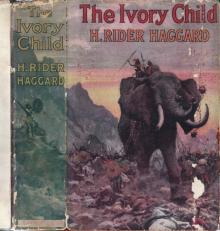 The Ivory Child
The Ivory Child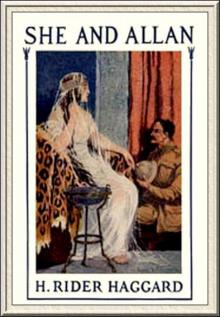 She and Allan
She and Allan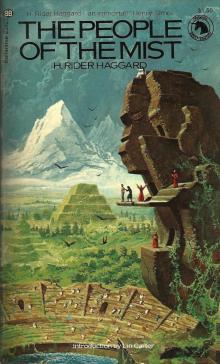 The People of the Mist
The People of the Mist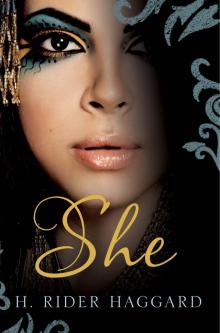 She
She Morning Star
Morning Star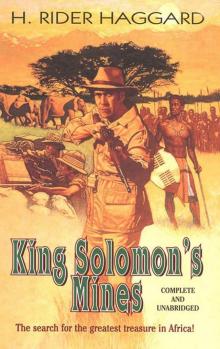 King Solomon's Mines
King Solomon's Mines She: A History of Adventure
She: A History of Adventure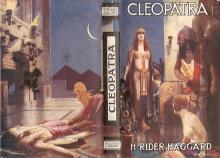 Cleopatra
Cleopatra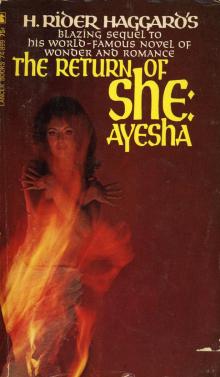 Ayesha, the Return of She
Ayesha, the Return of She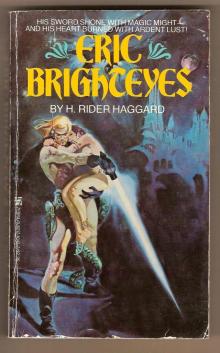 Eric Brighteyes
Eric Brighteyes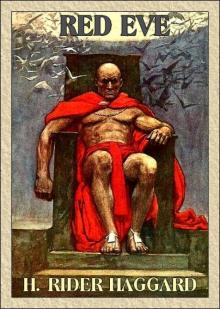 Red Eve
Red Eve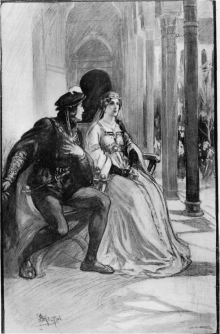 Fair Margaret
Fair Margaret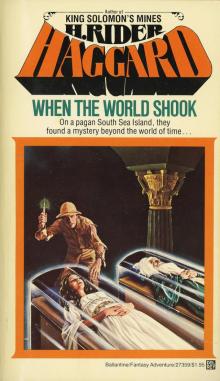 When the World Shook
When the World Shook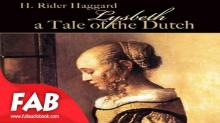 Lysbeth, a Tale of the Dutch
Lysbeth, a Tale of the Dutch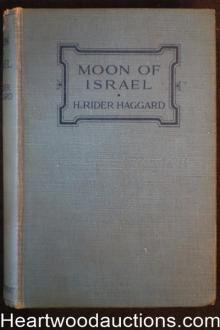 Moon of Israel: A Tale of the Exodus
Moon of Israel: A Tale of the Exodus Long Odds
Long Odds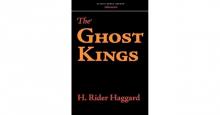 The Ghost Kings
The Ghost Kings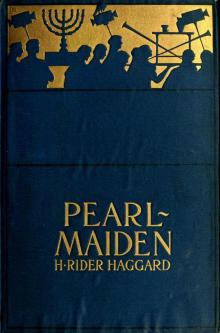 Pearl-Maiden: A Tale of the Fall of Jerusalem
Pearl-Maiden: A Tale of the Fall of Jerusalem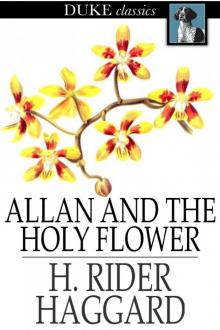 Allan and the Holy Flower
Allan and the Holy Flower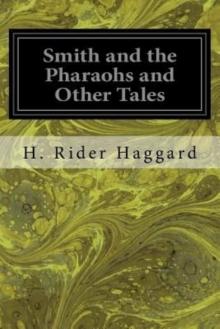 Smith and the Pharaohs, and other Tales
Smith and the Pharaohs, and other Tales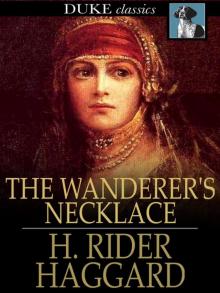 The Wanderer's Necklace
The Wanderer's Necklace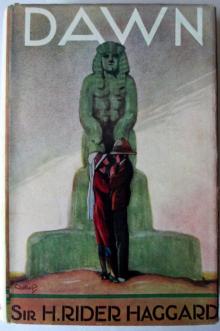 Dawn
Dawn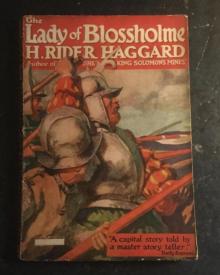 The Lady of Blossholme
The Lady of Blossholme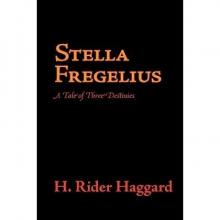 Stella Fregelius: A Tale of Three Destinies
Stella Fregelius: A Tale of Three Destinies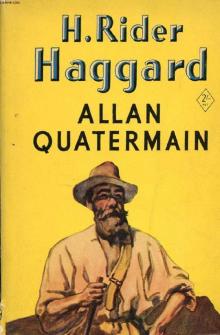 Allan Quatermain
Allan Quatermain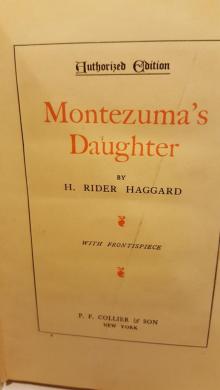 Montezuma's Daughter
Montezuma's Daughter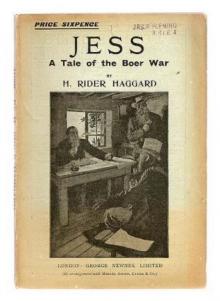 Jess
Jess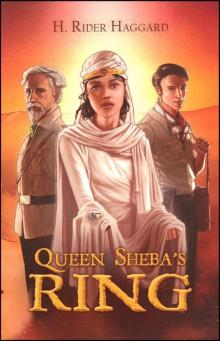 The Brethren
The Brethren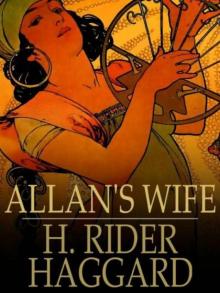 Allan's Wife
Allan's Wife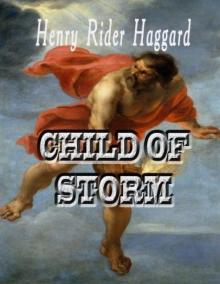 Child of Storm
Child of Storm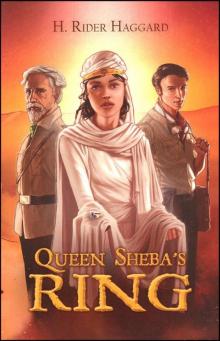 Queen Sheba's Ring
Queen Sheba's Ring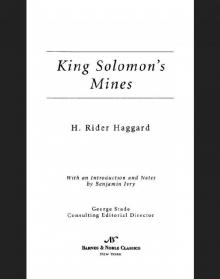 King Solomon's Mines (Barnes & Noble Classics Series)
King Solomon's Mines (Barnes & Noble Classics Series)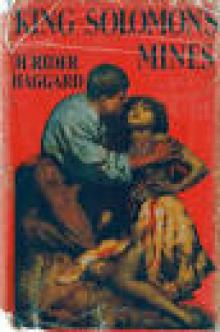 Complete Allan Quatermain Omnibus - Volumes 1 - 10
Complete Allan Quatermain Omnibus - Volumes 1 - 10